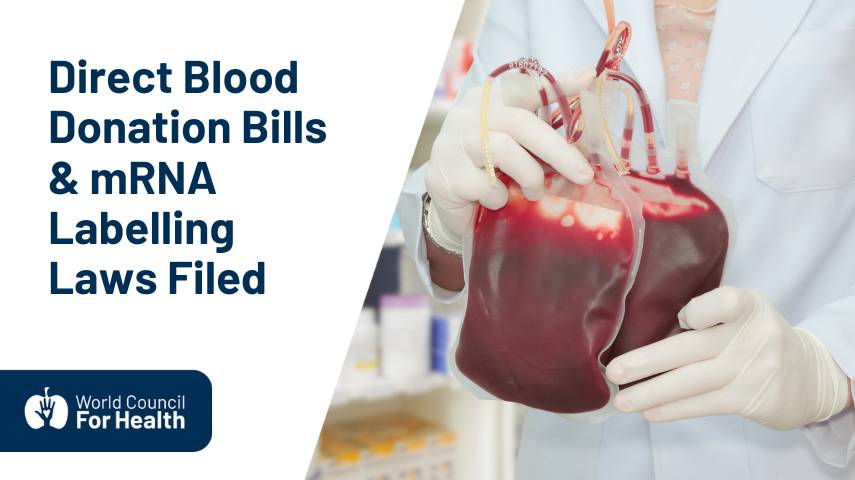In recent years, the conversation around blood safety and transparency has gained momentum. As medical advancements introduce new technologies, including mRNA-based therapies, a growing number of patients and healthcare advocates are calling for greater transparency in the blood donation system.
Across the United States, multiple states have introduced legislation addressing the rights of blood recipients, the disclosure of donor vaccination status, and the ability to request directed blood donations. This article provides an overview of the latest legislative efforts and their potential implications.
The 2025 legislative session has seen bills proposed in Tennessee, Illinois, South Dakota, Texas, Utah, Idaho, South Carolina, Maryland, and Kentucky. These bills seek to empower patients with greater choice. Below is an analysis of the key legislative efforts across these states.
Idaho – H0131: Blood Donation and Transfusion Act
∙ Key Provisions:
o Donor Disclosure: Requires blood donors to provide information about their vaccination status, including details on Covid-19 vaccinations.
o Recipient Rights: Permits patients to request blood from donors with specific vaccination profiles in non-emergency scenarios.
∙ Legislative Progress:
o Introduced in the Idaho House.
o Currently pending review by the Health and Welfare Committee.
∙ Implications:
o Focuses on increased transparency regarding donor vaccination history, which may affect donor willingness and overall supply if not balanced by public health data.
Illinois – HB1105: An Act to Amend the Illinois Clinical Laboratory and Blood Bank Act
∙ Key Provisions:
o Mandatory Testing: Requires blood banks to test all donated blood for the presence of any Covid-19 vaccine components and other messenger ribonucleic acid (mRNA) vaccine components.
o Donor Disclosure: Mandates that blood donors disclose whether they have received any Covid-19 or other mRNA vaccines.
∙ Legislative Progress:
o Referred to the Rules Committee on January 9, 2025.
∙ Implications:
o Testing Logistics: Implementing universal testing for vaccine components could strain laboratory resources and increase operational costs.
o Donor Privacy: Requiring disclosure of vaccination status may deter potential donors concerned about privacy.
o Scientific Validity: The necessity and efficacy of testing for vaccine components in blood donations may be subject to scientific debate.
Kentucky Bills: HB155, HB601, and HB745
HB155
∙ Key Provisions:
o Patient Option for Unvaccinated Blood: Establishes a framework allowing patients to request blood exclusively from unvaccinated donors in non-emergency situations.
∙ Legislative Progress:
o Introduced in the Kentucky House.
o Referred to the Health and Family Services Committee for review.
∙ Implications:
o Reflects growing patient interest in directed donations based on vaccination status, though it may conflict with broader public health data indicating the safety of all donor blood.
HB601
∙ Key Provisions:
o Segregation and Labeling: Mandates that blood banks segregate and label donated blood based on the donor’s vaccination status to facilitate directed donations.
∙ Legislative Progress:
o Introduced in the House.
o Currently awaiting assignment to a committee.
∙ Implications:
o Introduces operational complexities in blood bank management and could impact the efficiency of blood processing if not carefully implemented.
HB745
Key Provisions :
o Focus on Internal Tracking: Focused on enhancing internal tracking and reporting of donor vaccination status for regulatory and quality assurance purposes.
o Privacy and Data Security: The bill includes provisions to ensure that any collection of vaccination data remains confidential and is used solely for maintaining high safety standards in blood donation practices.
∙ Legislative Progress:
o Introduced in the Kentucky House.
o (The correct committee referral should be verified on the official Kentucky legislative website; initial reports citing a Judiciary Committee referral have been revised.)
Maryland – HB1456: Blood Donation Transparency Act
∙ Key Provisions:
o Transparency and Informed Consent: Requires blood banks to disclose donor vaccination status when requested, ensuring that patients are fully informed about the blood they receive.
o Data Handling: Establishes protocols for how vaccination data is collected and shared with patients.
∙ Legislative Progress:
o First reading in the House Health and Government Operations Committee.
o A hearing is scheduled, with further debate expected as the session progresses.
∙ Implications:
o Seeks to reinforce informed consent in blood transfusions while balancing public health safety and privacy concerns.
South Carolina – H3119: Blood Donation Choice Act
∙ Key Provisions:
o Directed Donations: Provides patients the option to designate specific blood donors for their medical procedures.
o Facility Obligations: Requires healthcare facilities to accommodate reasonable patient requests for directed blood donations.
∙ Legislative Progress:
o Prefiled in the House in late 2024.
o Referred to the Committee on Medical, Military, Public and Municipal Affairs.
o Awaiting further committee action.
∙ Implications:
o Aims to boost patient satisfaction and perceived safety; however, it may introduce challenges in maintaining an efficient, broadly compatible blood supply.
South Dakota – HB1078: An Act to Establish Provisions Related to the Disclosure of Covid-19 Vaccination Status and Blood Donations
∙ Key Provisions:
o Donor Disclosure: Requires blood donors to disclose their Covid-19 vaccination status at the time of donation.
o Recipient Information: Obligates blood banks to inform recipients of the Covid-19 vaccination status of the blood they receive, upon request.
∙ Legislative Progress:
o First read in the House and referred to the House Health and Human Services Committee on January 21, 2025.
o Scheduled for a hearing on January 30, 2025.
∙ Implications:
o Transparency vs. Privacy: While promoting transparency for recipients, the bill raises concerns about donor confidentiality.
o Operational Adjustments: Blood banks may need to modify their data collection and storage practices to comply with disclosure requirements.
o Public Perception: Providing vaccination status information could influence public perception of blood safety, regardless of scientific evidence.
Tennessee – SB0828: An Act to Amend Tennessee Code Annotated, Title 68, Relative to Blood Donations
∙ Key Provisions:
o Donor Disclosure: Requires individuals or entities collecting blood donations for transfusions to mandate that donors disclose their Covid-19 vaccination status.
o Recipient Rights: Allows patients in non-emergency situations to request blood transfusions from donors based on the donor’s Covid-19 vaccination status.
∙ Legislative Progress:
o Filed for introduction on February 4, 2025.
o Passed on first consideration on February 10, 2025.
o Passed on second consideration and referred to the Senate Health and Welfare Committee on February 12, 2025.
∙ Implications:
o Operational Challenges: Implementing donor disclosure requirements may necessitate changes in blood collection protocols and record-keeping.
o Supply Impact: Segregating blood based on vaccination status may affect the availability of compatible blood units.
Texas – SB125
∙ Updated Provisions:
o SB125 replaces the earlier SB1584. The current version refines requirements related to autologous and directed blood donations.
∙ Key Points:
o Physician Orders & Compliance: The bill continues to require that blood banks follow physicians’ orders concerning autologous or directed donations.
o Enhanced Donor Screening: New language in SB125 introduces or clarifies enhanced screening measures for donor eligibility, ensuring safety and transparency.
o Communication Requirements: There are updated provisions regarding the notification process for patients about donor characteristics and blood sourcing.
∙ Status:
o SB125 represents Texas’s current legislative approach, reflecting changes meant to modernize donor eligibility and safety standards.
Utah – HB0400: Blood Transfusion Amendments
∙ Key Provisions:
o Patient Autonomy: Empowers patients by allowing them to supply their own blood or choose specific donors for their transfusions.
o Disclosure Requirements: Mandates that healthcare facilities clearly inform patients about the source of transfused blood.
∙ Legislative Progress:
o Introduced in the House early in the 2025 session.
o Referred to the House Health and Human Services Committee and received favorable committee recommendations.
o Currently under review in the Senate Rules Committee.
∙ Implications:
o Enhances patient choice in transfusion practices while potentially raising questions about the impact on blood supply logistics and overall donor pool diversity.
______________________________________________________________________________________________
Wyoming- HB 0135 “Autologous or Direct Blood Donations,”
Key provisions:
- Hospital and Healthcare Facility Requirements: Licensed hospitals and healthcare facilities in Wyoming must permit patients scheduled for medical procedures to make autologous or direct blood donations if the facility offers blood donation services.
- Blood Bank Compliance: Blood banks are required to adhere to healthcare providers’ orders for autologous or direct blood donations, unless the donor is unfit due to health concerns such as illness, heart conditions, insufficient weight, or other medical reasons.
- Fee Structure: Blood banks may charge up to their standard fees for facilitating these donations and may impose storage fees for the donated blood until it is utilized by the intended recipient
The Bigger Picture: What This Means for Patients and Donors
The growing legislative focus on blood safety and transparency reflects a shift in public consciousness. As concerns about synthetic biologics and mRNA-based therapies rise, many patients are seeking greater control over the blood they receive during medical procedures. These bills highlight key themes that are shaping the future of blood donation policy:Informed Consent. Patients are demanding more transparency regarding the biological history of their transfusions.
Stay Informed and Get Involved
If you believe in the right to informed medical choices and ethical blood donation practices, now is the time to take action. Stay updated on legislative developments in your state, support initiatives promoting transparency, and join The Reconciliation, working to establish safe and ethical blood supply options.
The future of blood donation is changing—make sure your voice is heard.
This article has been reproduced with the permission of Sierra Hamm WCH Nursing (US).
Find out more about WCH Nursing
Join The Reconciliation: Read more on how we build an mRNA-free blood supply








